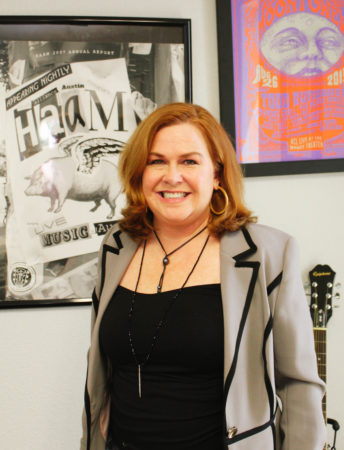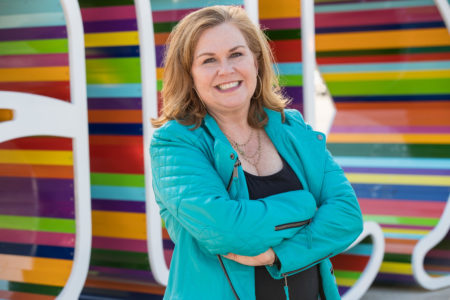One organization is on a mission to bring affordable health care to Austin’s musicians.
By Nick Barancyk, Photos by Malyana Ellis and Ben Porter
 This city wouldn’t be the Live Music Capital of the World without its musicians. More than 8,000 working local musicians generate billions of dollars for the Austin economy, yet many simply scrape by. With most earning less than $18,000 a year, that’s enough to afford only about two meals a day, meaning access to health insurance and dental exams remains unattainable. That’s where Reenie Collins steps in.
This city wouldn’t be the Live Music Capital of the World without its musicians. More than 8,000 working local musicians generate billions of dollars for the Austin economy, yet many simply scrape by. With most earning less than $18,000 a year, that’s enough to afford only about two meals a day, meaning access to health insurance and dental exams remains unattainable. That’s where Reenie Collins steps in.
As the executive director of the Health Alliance for Austin Musicians, Collins helps provide access to reasonably priced care for the city’s artists.
“If musicians aren’t alive, they can’t make music,” she says.
Behind the curtain
Through its collaborative organizational model, HAAM doesn’t directly provide health services but creates the framework through which to connect its members to discounted insurance policies and affiliated health professionals throughout the city.
“We’re not insurance,” Collins says, “but it feels like insurance.”
Collins notes that HAAM is crucial for local musicians because even after government subsidies, insurance premiums can still end up being too expensive for low- income artists.
“ ‘Affordable’ is a very relative term,” she says.
Through its partnerships, HAAM is able to provide medical, dental, vision, hearing, mental-health and wellness benefits at a significantly reduced to fully subsidized rate for its members. The cooperative nature of the city makes all this possible.
“Austin is a pretty collaborative town,” Collins says. “And that’s what we’re built on, collaborative relationships.”
By working with this partner-oriented structure, Collins says HAAM is able to spread resources more effectively and better serve the community.
Facing the music
 Collins assumed the directorship in 2013 but has consulted with HAAM since its inception in 2005. And despite being an outsider to the music industry, the cause was so worthwhile that when HAAM’s last director moved on, she stepped out of retirement to help.
Collins assumed the directorship in 2013 but has consulted with HAAM since its inception in 2005. And despite being an outsider to the music industry, the cause was so worthwhile that when HAAM’s last director moved on, she stepped out of retirement to help.
“Music is so important to who we are and to our souls,” she says. “It’s important to this city.”
With more than 25 years of health-care experience, Collins is intimately aware of its complexity. Each year, HAAM has had to retool its efforts to keep up with the shifting sands of both federal and state systems.
“For our creative class, musicians included, a lot of the great things about this city…have changed. I think that it’s harder for people to stay in Austin and earn a living,” Collins says, noting this can take an emotional toll.
HAAM currently serves more than 2,500 members, working with each individually to ensure their needs are met. And Collins notes HAAM does this better than any other organization.
“I take a lot of pride in it but I also feel a huge sense of responsibility,” she says. “There’s always more that you can do and less that you have to deal with.”
Striking the right cord
Collins often tells the story of a young musician in New York who couldn’t scrape together $100 for antibiotics. His infection worsened and he was rushed to the emergency room, where doctors treated him for sepsis. His final medical bill was more than $23,000. He couldn’t afford it, so the hospital had no choice but to accept him on the basis of charity care.
If that patient, now an Austin musician and a HAAM member, had access to basic health care, he wouldn’t have incurred such an inflated medical expense.
“We’re actually saving this system and saving this community money because we’re keeping people well and healthy,” Collins says. “We’re keeping them from using the most expensive resources in the most expensive way.”
By providing access to general health care, HAAM is able to reduce the number of these medical horror stories. But the real benefit for Austin’s working musicians, Collins explains, is having the peace of mind that if something spins out of control, they’re covered.
“Health care is a basic need that people need to have met,” she says.
Fit as a fiddle
Collins isn’t sure how many lives HAAM has saved. It’s not a statistic the nonprofit keeps track of, but she has hundreds of musicians’ success stories in her repertoire, stories of legs saved from amputation and heart attacks treated in ample time. And although she never takes center stage, Collins admits she loves running the show.
“This is the best gig I’ve had in my entire career,” she says.
As long as there’s a need, HAAM will be there, quietly watching over the heart of this city, one artist at a time.


